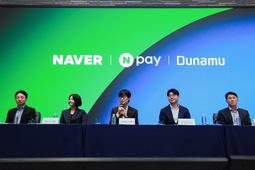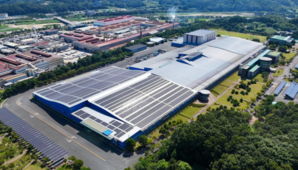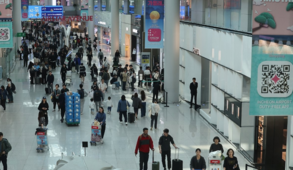
[News Space=Reporter seungwon lee] Jaseng Oriental Medicine Hospital is the largest Oriental medicine hospital network in Korea, and is a medical institution that focuses on non-surgical spinal treatment and Oriental medicine treatment.
As a public interest non-profit medical corporation, Jaseng Oriental Medicine Hospital focuses on medical treatment activities and delegated various support functions necessary for hospital operation, such as management, public relations, marketing, branding, education, IT, interior, and equipment purchase, to a separate specialized company (JSD One, MSO: Management Service Organization).
JSD1 (CEO Jong-ho Yeom) is continuing to grow in terms of sales, operating profit, and net profit, but is also facing structural limitations such as liquidity risk due to short-term liquidity risk and debt management, concentration of transactions with special related parties, and lack of diversification of growth engines.
In particular, sales generated from special related parties (including affiliates of Jaseng) exceeded KRW 10 billion in 2024. This is the cost of services such as management consulting, public relations, rental, and management for Jaseng Oriental Medicine Hospital and affiliated medical institutions.
A corporate financial analysis expert explained, "It is a structure in which affiliates such as Jaseng Oriental Medicine Hospital intensively order various services such as management, public relations, consulting, and leasing from JSD1. It is a family business with a 'typical work-sharing' structure in which more than 20% of JSD1's sales come from transactions with special related parties (affiliates and executives)," and "It is a structure designed to maximize profits at each stage through internal transactions with Jaseng affiliates."
JSD1's major shareholders are also Chairman Shin Jun-sik and his family, and transactions with Jaseng Oriental Medicine Hospital, Jaseng Medical Foundation, Jaseng Medi-Bio Center, JSD One Co., Ltd., and Green Myungpum Pharmaceutical Co., Ltd. account for a significant portion of sales. They are building a typical family business-special relationship network that forms a profit structure by giving each other work at each stage, such as prescriptions, herbal medicine supply, decoction (compounding), and consulting.
According to the audit report submitted to the Financial Supervisory Service's electronic disclosure system on the 24th, JSDI One's sales (operating income) in 2024 increased by 4.4% year-on-year to KRW 46.4 billion (KRW 44.4 billion). Operating profit increased by 6.2% year-on-year to KRW 21.2 billion (KRW 19.9 billion), and net income also increased by 11.4% year-on-year to KRW 13.2 billion (KRW 11.8 billion).
The operating profit ratio was a whopping 45.7%, a slight improvement over the previous year (44.9%).
Retained earnings increased 9.4% year-on-year (KRW 140.9 billion) to KRW 154.1 billion. Dividends and dividend rates were not separately mentioned in the public notice and thus were not confirmed.
Selling and administrative expenses increased by 2.8% year-on-year (KRW 24.5 billion) to KRW 25.2 billion. By item, salaries were KRW 8.15 billion (KRW 7.9 billion the previous year), commissions were KRW 350 million (KRW 340 million the previous year), advertising and publicity expenses were KRW 13.51 million (KRW 5.74 million the previous year), depreciation expenses were KRW 3.6 billion, and rent was KRW 1.4 billion.
Although salaries and retirement benefits for key executives are not disclosed as separate items, employee salaries (KRW 8,157,830,000), retirement benefits (KRW 698,340,000), and welfare expenses (KRW 571,580,000) are included in sales and administrative expenses.
As for financial transactions with special related parties, accounts receivable with shareholders, executives, etc. amounted to 562.5 million won, and accounts receivable with other special related parties (Green Myungpum Pharmaceutical Co., Ltd.) amounted to 83.43 million won. Sales (operating revenue) with special related parties amounted to a total of 10.03788 billion won.
The debt ratio is 98.1%, meaning that total liabilities are 151.6 billion won compared to total assets of 306.2 billion won, and total capital is 154.6 billion won. This means that the company has almost half debt and half of its own money.
The current ratio is approximately 30.4% based on current assets of 34.5 billion won and current liabilities of 113.2 billion won, which is a level that is somewhat burdensome in terms of short-term liquidity. Short-term borrowings are 107 billion won, current liabilities are 113.2 billion won, and cash and cash equivalents are 30.7 billion won. This means that assets that can be converted into cash immediately (34.5 billion won) are far less than debts that must be repaid within a year (113.2 billion won). Generally, a current ratio of 100% or higher is considered safe, but short-term financial pressure is severe.
A corporate finance analysis expert pointed out, "JSD One's biggest risk is the sharp decline in its current ratio (30.4%). Short-term borrowings (KRW 107 billion) and current liabilities (KRW 113.2 billion) far exceed current assets (KRW 34.5 billion), so a short-term liquidity crisis is always present." He added, "This increases management uncertainty in that it may face difficulties in raising funds during periods of rising interest rates or a tightening financial market."
Intangible assets include software, etc., amounting to KRW 325.32 million (KRW 448.68 million in the previous year), and KRW 123.36 million was reflected as intangible asset amortization expenses for the year 2024.
Legal proceedings and contingent liabilities were stated as “not applicable” in the report.
A corporate finance analysis expert evaluated, "Since the proportion of transactions with special related parties is significant, external views on accounting transparency could also be a burden." He added, "Sales growth and operating profit margin are good, but cash flow and short-term debt structure are weak, so resistance to external shocks is weak. In other words, the minimal intangible assets and the absence of intellectual property rights-based revenue sources such as royalties could also limit securing mid- to long-term growth momentum."
Meanwhile, the reasons why Jaseng Oriental Medicine Hospital established a separate company, JSD1, can be summarized into three main points.
The first is to improve specialization and efficiency through the establishment of a hospital management support (MSO) system. Jaseng Oriental Medicine Hospital focuses on treatment and delegates various support functions necessary for hospital operation to a separate specialized company (JSD One, MSO: Management Service Organization).
The second is the separation of roles between non-profit corporations (medical foundations) and for-profit corporations (business companies). Under the Medical Act of the Republic of Korea, hospitals (medical foundations) are non-profit corporations and have restrictions on profit-making businesses. Accordingly, the Jaseng Oriental Medicine Hospital (Jaseng Medical Foundation) was structured to focus on public functions such as treatment, research, and social contribution, while profit-making businesses (management consulting, real estate leasing, IT, education, marketing, etc.) were handled by a separate for-profit corporation (JSD One).
This structure allows hospitals to receive stable profits and management support by overcoming legal and institutional limitations, as JSDI One performs various tasks that medical institutions cannot directly perform under the current legal situation.
Third, the implementation of a family business network and a work-saving structure. JSD1 is a family company in which Chairman Shin Joon-sik's family owns 100% of the shares. The major shareholders and share ratios of JSD1 are Shin Dong-jin 40%, Shin So-yeon 20%, Shin Ji-yeon 20%, Shin Joon-sik 10%, and Jeon Il-sak 10%.
Shin Jun-sik, chairman of Jaseng Oriental Medicine Hospital, and his wife Jeon Il-sak, CEO of Jaseng Holdings; Chairman Shin’s eldest son Shin Dong-jin, eldest daughter Shin So-yeon, and second daughter Shin Ji-yeon. Chairman Shin Jun-sik’s son-in-law, who married his second daughter Shin Ji-yeon, is Lee Won-mo, the secretary for civil service discipline at the presidential office and a former prosecutor. He is known as the youngest of Yoon Seok-yeol’s division, and it was reported in the media that President Yoon Seok-yeol personally arranged and married the second daughter of the chairman of Jaseng Oriental Medicine Hospital. Chairman Lee’s younger brother, Shin Min-sik, is the director of Jamsil Jaseng Oriental Medicine Hospital.
In other words, Jaseng Oriental Medicine Hospital provides treatment and prescriptions, Jaseng Bio (Medi-Bio Center) prepares and supplies herbal medicines, and JSD One provides management, public relations, and consulting, all of which give and take work from each other at each stage, thereby maximizing the profits of the family business network.
This structure enables the simultaneous achievement of multiple goals, including nationwide expansion of the oriental medicine hospital chain, brand unification, management efficiency, and stable profit generation for family businesses.
Meanwhile, Lee Won-mo, the Secretary to the President for Public Ethics, declared a total of 39,789,480,000 won in assets, making him the wealthiest person among high-ranking public officials at the level of Secretary to the President. According to the ‘2025 Public Officials’ Regular Asset Changes Disclosure’ by the Government Ethics Committee on March 27, 2025, Secretary Lee Won-mo ranked first among high-ranking public officials at the Presidential Office and fifth among 2,047 people subject to disclosure.
The secretary reported 4.95687 billion won worth of buildings owned by him and his spouse, 5.87091 billion won worth of deposits owned by him, his spouse, and his eldest son, and 28.47003 billion won worth of securities. Compared to the previous period, his assets increased by 659.07 billion won.
In addition, Lee Won-mo, who ran as the People's Power candidate for the Yongin Gap constituency in Gyeonggi Province in the 2024 April 10 general election, declared his assets, stating that he, his wife Shin Ji-yeon, and his eldest son own 16,096 shares of SK Hynix stock, worth 2.16 billion won.
The Democratic Party of Korea said, "He is running for office in Yongin Gap, where SK Hynix's large-scale factory is being built, and he is making abusive promises of support. Eventually, on March 25, even President Yoon Seok-yeol, who was his closest aide, appeared at Yongin City Hall and pledged to invest 500 trillion won in the Yongin Semiconductor Cluster." They also raised the issue of a "conflict of interest," saying, "If he holds tens of billions of won in stocks in a specific company, makes abusive promises of support, and even the president has expressed his intention to provide astronomical amounts of support, how is this any different from buying land and changing the route of a highway nearby?"
In addition, they claimed, "As of March 2023, the SK Hynix stock valuation of candidate Lee Won-mo's family was worth 1.1 billion won, but they made a price difference of 1 billion won in just one year. Furthermore, the SK Hynix stock asset declaration was 2.16 billion won, but the valuation based on the closing price on March 25, 2024 was over 2.7 billion won. They made a price difference of 500 million won in just a few days."
























































